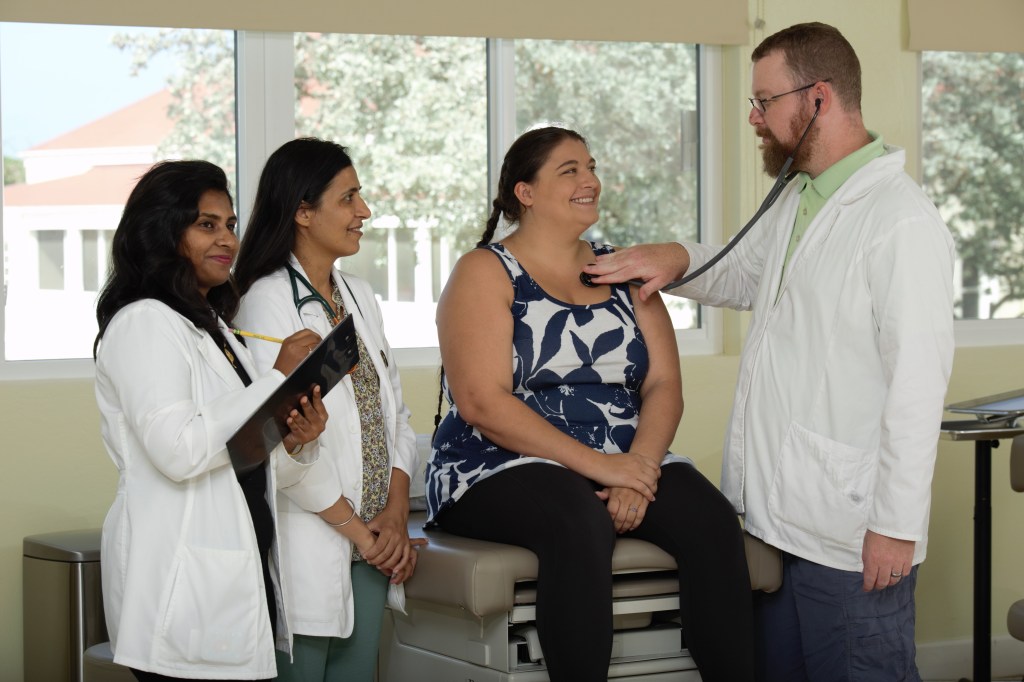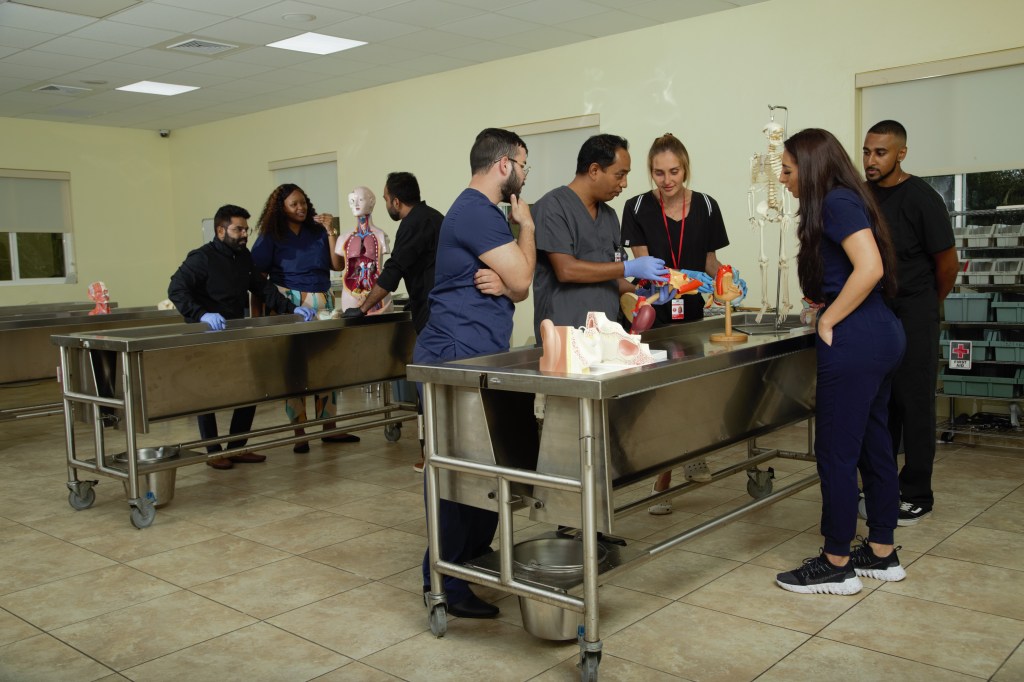
What Is a Medical Residency Program and What Do They Involve?
Learn more about residency programs and what you can expect as a medical student.
Last updated: September 17, 2024.
Graduating medical school and earning your Doctor of Medicine (MD) degree is a massive achievement, but this does not mean that the educational journey for new physicians is over. Quite the contrary, as the most intensive hands-on learning opportunities are yet to come, in what is called residency.
A postgraduate residency med program provides MD program graduates with the chance to develop specialized knowledge and skills in a specific branch of medicine by providing real care during a hospital residency or in a clinic, and learning from professionals in that field. A residency program generally lasts between 3 to 7 years, depending on the specialty being pursued.
Whether you’re already on your journey to becoming an MD or you’re still considering, you likely have thought about residency and may have unanswered questions. If you’re curious and asking yourself, ‘what is a medical residency program’ and ‘how does residency work,’ then read on to take a closer look at what to expect from a medical residency.
When do medical residencies start?
A medical doctor residency is the period of training that you undertake after completing your studies in medical school and graduating with an MD degree. MD residency takes place in a working hospital or a clinic and provides in-depth, hands-on training within a specialized field of medicine.
MD program students apply for residencies that match their career aspirations during their final year in medical school. Then, on Match Day, which occurs in March, students find out where they will be doing their residency. It’s a very fulfilling and exciting time for future MDs!
And if you’re wondering how long do doctors do residency, the length of your medical residency depends on which area of medicine you are choosing to specialize in. For example, a family medicine practice residency would usually last three years, while a surgery residency may last five to seven years.
What’s the difference between a resident and a student?
An MD resident will be performing the duties of a physician while under supervision. The goal is to continue your health care education and provide direct care to patients. This includes diagnosing, managing and treating health conditions. You’ll gain more hands-on experience, engage in active learning (alongside your off-duty study time) and receive mentorship from experienced doctors in your chosen field.
To start, you’ll be assigned less complicated tasks and experience more oversight and direct supervision from doctors and senior residents. The responsibilities you are assigned and degree of independence you receive will increase as you gain skills, experience and confidence.
What are the requirements for residency medical programs?
Most medical residencies will list their program requirements for applicants on their website. This often includes medical school graduation, types of work visas accepted and allowed attempts on a specific licensing exam.
The best way to ensure you are suitable for your chosen residency is to take a look at the website of the hospital or clinic that you are applying to and checking the specifications listed. Generally, you will require a medical degree and resident physician license to undertake a residency in the U.S. or Canada.
What to expect as a resident doctor?
During your residency, you will gain the skills and knowledge you need to pass required licensing exams and eventually practice independently in that medical discipline. You will work closely with professionals and your fellow residents to examine, diagnose and provide care for patients. You are also expected to continue your studies at home. Finding a good balance between hands-on, personal and mentored study during your residency is vital for success. As a medical resident, your tasks may include:
- Initial and ongoing assessments of patient’s medical status
- Performing patient histories and physical examinations
- Performing rounds
- Developing assessment and treatment plans
- Recording admission notes, progress notes, procedure notes and discharge summaries
- Ordering tests, studies and medications
- Interacting with the family of the patient
How much do medical residents work?
The Accreditation Council for Graduate Medical Education rules in the United States indicate that residents can work a maximum of 80 hours a week, averaged over 4 weeks.
Medical residents usually work between 40 and 80 hours a week, depending on their specialization and rotation. First-year residents may work no more than 16 hours continuously, while more senior trainees may work a maximum of 24 hours continuously. In order to stay alert and focused, strategic rest (on-site napping) is encouraged for interns and medical residents who are working longer shifts.
How to succeed in residency?
New physician residency can be a difficult time for recently qualified MDs. You work long hours and must drive your own learning more regularly than in medical school. However, the hands-on skills, active learning and mentorship you will gain from an MD residency placement are invaluable.
In order to find sustainable success, here are some tips to help you succeed in residency:
- Keep learning — It’s important to keep growing and learning as a physician. Make sure you seek out learning opportunities and take the time to continue your studies in your own time to further develop the practical skills you are learning on the job.
- Be professional — Remember that as a doctor, you often see people in pain, struggling and at a bad time in their lives. It is vital that you develop and maintain your professional demeanor, even during challenging moments.
- Stay motivated — Moving onwards into a residency program can be a change of pace for doctors who have recently graduated. You are no longer graded on your educational achievements. You’ll still receive feedback on your work, but it will be based on becoming a better doctor rather than an educational grade.
- Take care of yourself — It’s essential to make sure you look after your physical and mental wellbeing during your internship and the following residency. Looking after your diet, sleep, hygiene and daily exercise can keep you in a positive frame of mind and prevent burnout.
- Connect with your community — Remember that you’re not alone. Other interns, residents and doctors can help you along your path and provide teaching moments, support and mentorship.
What comes after residency?
After completing a residency, doctors may choose different paths. They can immediately look to practice independently as licensed physicians or become instructors themselves, or they can pursue more education if they’d like to further specialize in their field of medicine. The following are a few possible next-steps to be aware of:
- Specialty Board Examinations: Specialty board exams certify that you have the knowledge and skills necessary to practice independently in a given medical field. Successfully completing them is necessary for securing hospital privileges and insurance panel participation.
- Fellowship Programs: Some physicians choose to pursue further training via fellowship programs, which provide enhanced training in medical subspecialties. Fellowships can last from one to three years, and help doctors develop extremely specialized skills.
- Applying for Jobs: After residency (and possibly a fellowship), it’s time to begin applying for jobs. Whether you want to work at a hospital, private practice or in education/training, job searching is essential for those starting a career in medicine.
Conclusion
Residency is an exciting time and something that all aspiring MDs are likely thinking about. However, before that you’ll need to complete a medical program that can help you get there.
At Medical University of the Americas, we proudly help students become practicing doctors in the U.S., Canada and around the world. Our 4-Year MD program features expansive learning opportunities, individualized support and dedicated faculty that are committed to helping students succeed.
If you’d like to learn more or ask questions about residency, please don’t hesitate to contact us.


FAQs About Medical Resident Physicians
Following residency, doctors can undertake their licensing exams in order to practice independently. They can also choose to further develop their specialized skills via more education, called Fellowships. Or they can pursue opportunities in the educational field, as professors or instructors.
Yes, residency begins after medical school, once medical students graduate as MDs. Students apply for residencies that match their career aspirations during their fourth year of medical school. They find out about their official residency placement in March of their final year, on Match Day.
Medical residencies typically start after participants have graduated from medical school as MDs. Specific start times for different residency programs may vary, so verify when a program starts before you apply.
Residency programs typically last between three and seven years, depending on the specialty being pursued. For example, an Internal Medicine or Pediatrics residency usually lasts for three years, whereas a Plastic Surgery residency lasts six years and a Neurosurgery residency lasts seven years.
